****The children here are full of love and energy****

Dong-Ao (東澳) is located on the Eastern coast of Taiwan, between Hualien (花蓮) and Yilan (宜蘭). It is a beautiful, rainy little bay, backed by mountains. The main industry is fishing, however surrounding areas host factories which extract White Stone for drywall and housing, and a grey stone for cement.
The town is small and composed mostly of aboriginal Atayal Taiwanese (1 of 12 groups). With a story not dissimilar to many aboriginal populations (Australia, the US), numbers are diminished and alcoholism is prevalent. Years before, this land all belonged to aboriginal peoples. After the Japanese Occupation (between 1895 and 1945) the land was given to the Chinese Nationalist Party (Kuomintang 國民黨), and the ruling governemnt party since has offered compensation packages involving satellite dishes (60 Channels) and monthly checks (enough for some beer and too many rounds of Mah Jhong, such that school fees are hard to come by).
However, there are more recent efforts to preserve the traditional elements of the culture (though heavily criticized as "exploitative and 'superficial'"), and many aborigines are taking personal steps to advance their voice in the community. In fact, the majority of Taiwanese have some degree of shared blood with aboriginal peoples.
The political and cultural image of the community aside, Dong-Ao is a beautiful town, with moss covered concrete, multi-colored tiles and flowerbeds, and ancient trees set between a backdrop of mountain and sea.

Dong-Ao (東澳) is located on the Eastern coast of Taiwan, between Hualien (花蓮) and Yilan (宜蘭). It is a beautiful, rainy little bay, backed by mountains. The main industry is fishing, however surrounding areas host factories which extract White Stone for drywall and housing, and a grey stone for cement.
The town is small and composed mostly of aboriginal Atayal Taiwanese (1 of 12 groups). With a story not dissimilar to many aboriginal populations (Australia, the US), numbers are diminished and alcoholism is prevalent. Years before, this land all belonged to aboriginal peoples. After the Japanese Occupation (between 1895 and 1945) the land was given to the Chinese Nationalist Party (Kuomintang 國民黨), and the ruling governemnt party since has offered compensation packages involving satellite dishes (60 Channels) and monthly checks (enough for some beer and too many rounds of Mah Jhong, such that school fees are hard to come by).
However, there are more recent efforts to preserve the traditional elements of the culture (though heavily criticized as "exploitative and 'superficial'"), and many aborigines are taking personal steps to advance their voice in the community. In fact, the majority of Taiwanese have some degree of shared blood with aboriginal peoples.
The political and cultural image of the community aside, Dong-Ao is a beautiful town, with moss covered concrete, multi-colored tiles and flowerbeds, and ancient trees set between a backdrop of mountain and sea.
Spring is here and the school-year is nearing end.
It's time for annual aboriginal community Sport's Day Competitions!
Schools take (more than) a few class periods to rehearse and prepare for the weekend events, which take place on school grounds and draw most of the communities.

At Dong-Ao Elementary School (東澳國小) competitions range from silly relay races, 100m Dashes, and Archery Marksmanship while students also perform traditional aboriginal songs and dances.
It's time for annual aboriginal community Sport's Day Competitions!
Schools take (more than) a few class periods to rehearse and prepare for the weekend events, which take place on school grounds and draw most of the communities.

At Dong-Ao Elementary School (東澳國小) competitions range from silly relay races, 100m Dashes, and Archery Marksmanship while students also perform traditional aboriginal songs and dances.
Song and Dance are important parts of the aboriginal culture.
****The head of the curricular office at Dong-Ao leads students in a rhythmic and soulful tune****
****The head of the curricular office at Dong-Ao leads students in a rhythmic and soulful tune****

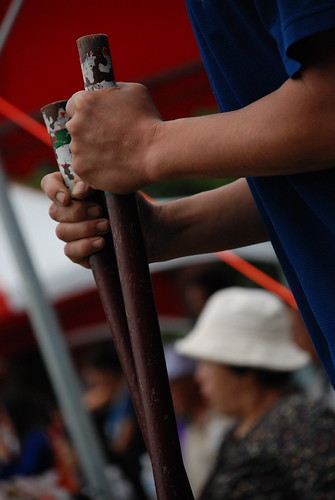
 The song tells the story of Atayal courtship and marriage.
The song tells the story of Atayal courtship and marriage.****5th graders perform a courtship dance****
 ****This involves circling each other in time with the music****
****This involves circling each other in time with the music****
****After a successful courtship, the couple are married. The boy does a protective dance while the girl mimics traditional female roles, such as weaving and preparing food****


 ****Races were the bulk of the competitions****
****Races were the bulk of the competitions**** ****Preschool Heat****
****Preschool Heat**** ****Kindergarten Heat****
****Kindergarten Heat**** ****1st Grade****
****1st Grade****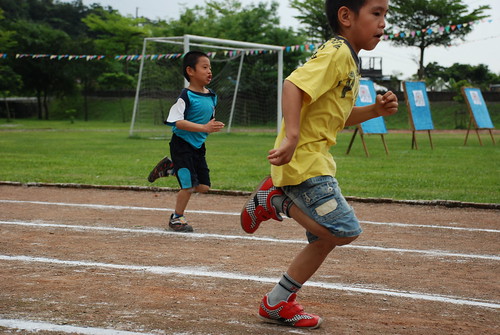
****4th Grade Girls Heat****
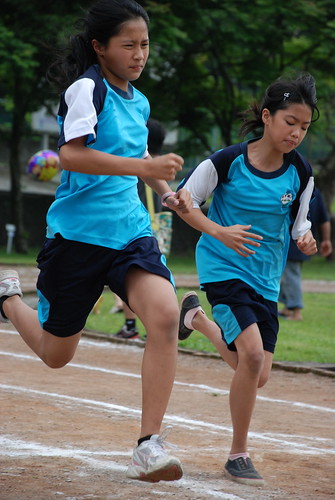
****4th Grade****
 Smoking is still a prevalent habit here, even on school grounds and during a sporting event.
Smoking is still a prevalent habit here, even on school grounds and during a sporting event.****A Healthy Onlooker****
 ****Gagging?****
****Gagging?****

***The whole community gets involved in the racing****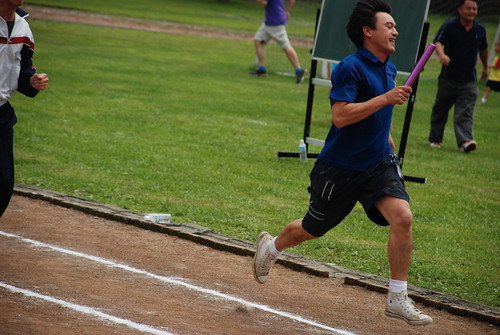 ****Parents desperately try to convey the race concept to their toddlers****
****Parents desperately try to convey the race concept to their toddlers****

****Some clearly would rather not participate****

****Grandpas get involved****
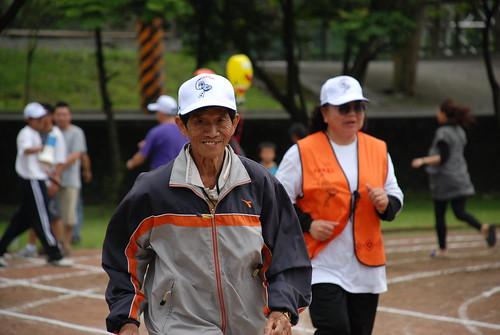 ****As well as Grandmas****
****As well as Grandmas****
 ****Future Participant On the Sideline****
****Future Participant On the Sideline****

****Able-bodied young men from the community chat and smoke on the sidelines after a race****
 ****Face of Determination****
****Face of Determination****
 ****100m Dash Buddies****
****100m Dash Buddies****
 ****Full Support for all Members - Cheers on the sidelines and motivational words from the MC for this participant with a cane****
****Full Support for all Members - Cheers on the sidelines and motivational words from the MC for this participant with a cane****
 Archery is an important part of the culture, reflecting times not so long ago when targets weren't paper printouts.
Archery is an important part of the culture, reflecting times not so long ago when targets weren't paper printouts.
 ****Gagging?****
****Gagging?****
***The whole community gets involved in the racing****
 ****Parents desperately try to convey the race concept to their toddlers****
****Parents desperately try to convey the race concept to their toddlers****
****Some clearly would rather not participate****

****Grandpas get involved****
 ****As well as Grandmas****
****As well as Grandmas**** ****Future Participant On the Sideline****
****Future Participant On the Sideline****
****Able-bodied young men from the community chat and smoke on the sidelines after a race****
 ****Face of Determination****
****Face of Determination**** ****100m Dash Buddies****
****100m Dash Buddies**** ****Full Support for all Members - Cheers on the sidelines and motivational words from the MC for this participant with a cane****
****Full Support for all Members - Cheers on the sidelines and motivational words from the MC for this participant with a cane**** Archery is an important part of the culture, reflecting times not so long ago when targets weren't paper printouts.
Archery is an important part of the culture, reflecting times not so long ago when targets weren't paper printouts..jpg)










